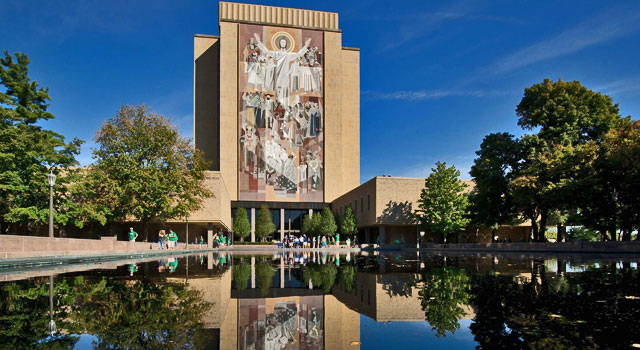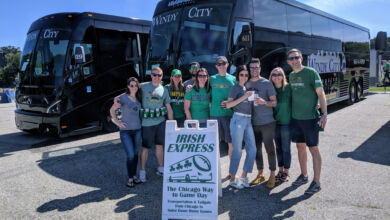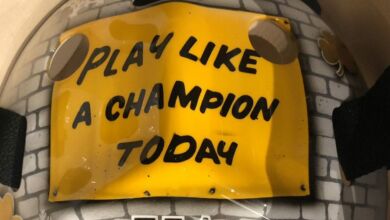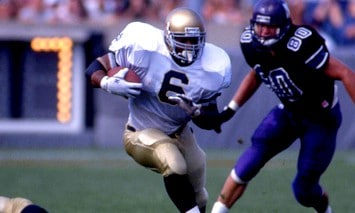

Earlier tonight the Observer reported some very sad news in the world of Notre Dame. Father Theodore Hesburgh, President of the University from 1952-87, passed away at the age of 97.
Fr. Theodore Hesburgh has died at the age of 97, a University spokesperson confirmed.
— The Observer (@ObserverNDSMC) February 27, 2015
Hesburgh’s tenure as President of Notre Dame is the longest in the history of the University spanning 35 years. During that time, the enrollment at Notre Dame nearly doubled while the University also saw unprecedented growth in the endowment as well as funding for research.
Hesburgh collected numerous awards throughout his career, but his most notable accomplishment to most fans is the naming of the University Library in his honor. Originally named the Memorial Library upon opening in 1963, it was renamed the Hesburgh Library in 1987.
Notre Dame football fans have Hesburgh to thank for ending Notre Dame’s policy of not participating in post season bowls in 1970. Notre Dame played Texas in the Cotton Bowl that year with Notre Dame using the proceeds from the bowl to fund University scholarships.
From 1990-96 Hebsburgh was also a member of the Knight Commission which reformed college sports leaving his mark well beyond the boundaries of the campus of Notre Dame.
Other notable accomplishments for Hesburgh include:
- Appointed to Civil Rights Commission (1957)
- Presidential Medal of Freedom (1964)
- Chair of Civil Rights Commission (1969)
- Congressional Medal of Honor (1999)
- First recipient of the Gerald Ford Award (2004) for leadership in college athletics
Notre Dame lost a great man with the passing of Father Hesburgh. The thoughts and prayer of the entire UHND community, just as those of millions of Notre Dame alumni and fans around the world, go out to Father Hesburgh tonight.




Theodore Martin Hesburgh was quite remarkable, a man in full, but ever a priest secundum ordinem Melchisedech.
When Jesus picked his apostles, the choice Christ made was telling. There was the traditional rabbinical class, who had been scrabmbling the Jews’ spiritual brains for centuries. Christ, basically, called the Jewish Rabbinical establishment out so stridently and unequivocally, that they plotted to kill Him.
But Christ also rejected another, attractive, but less devilish choice. It was John and the essenes, the first Christ-i-an desert mystics. Christ called John the greatest of all men born of woman (yet lesser than all who would soon flourish under the reign of Christ.) But Christ did not choose his disciples from this ascetic, gaunt, mystical class.
He chose the “people of the people,” the first anointment of the “Catholicity” of Christianity. Fishermen, workers, tax collectors, married as well as single people who walked where the souls walked and lived as the souls lived.
Desert and other mystics inflame and infuse our Crhistianity from John Of the Cross to both Theresa’s (Avila and that Little Flower) to Meister Eckhart, to Therese Neuman.
But the clergy ever is from our peers.
Hesburgh, ever the priest, walked in the world. His walks around campus were never staged or stilted. He was “one of us” while simultaneously being “primus inter pares.” And he never cheapened the fire of Christ’s word and the Christian prerogative.
I remember a couple of nearly salty sermons dealing with the challenge of America’s incipient sexual frenzy, and the different rout REQUIRED by followers of Christ.
He let his yeah be yeah and his nay be nay. Whether backhanding student uprisings or backhanding politicos who sought to quiet him on civil rights, he was not bashful.
And he steered Notre Dame through an unusual time, from an era when Catholicism was both revered and despised (cf Al Smith’s candidacy) to a time when Catholicism was both ridiculed and minimized.
Ted’s message never changed, the soil on which it fell did.
I find it odd to contemplate how much he would be missed. Everyone dies. But I find it preferable to reflect how many folks, on and off campus, he influenced. For in every Christian Way, he forced us to deal with and elevate the better angels of our nature.